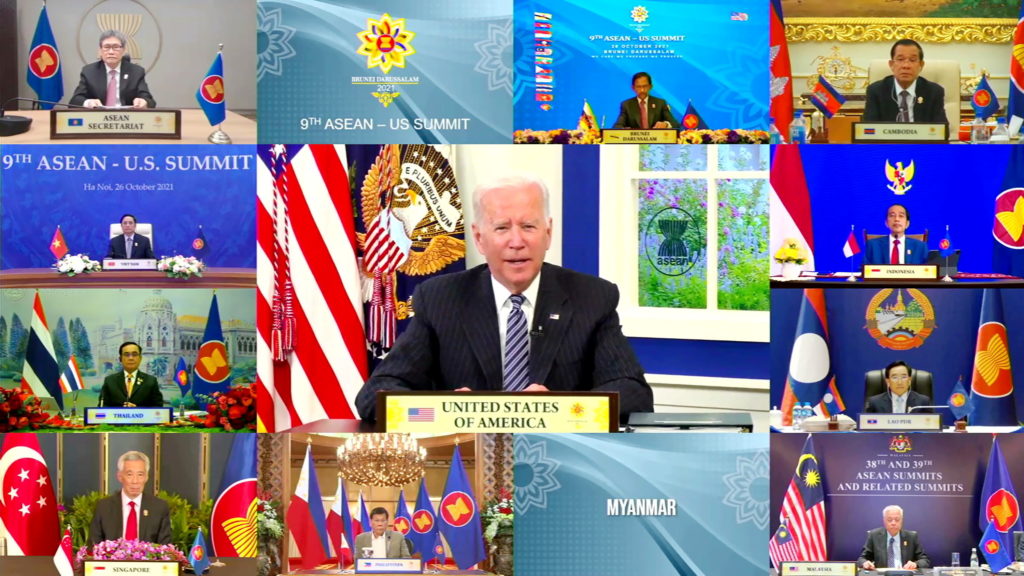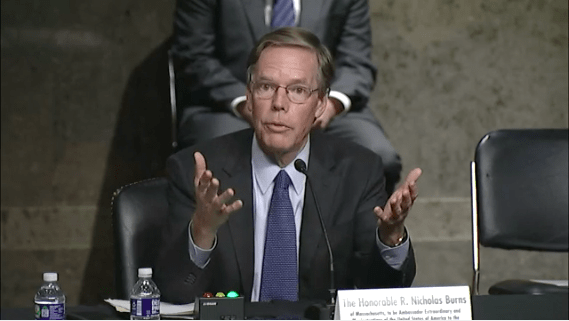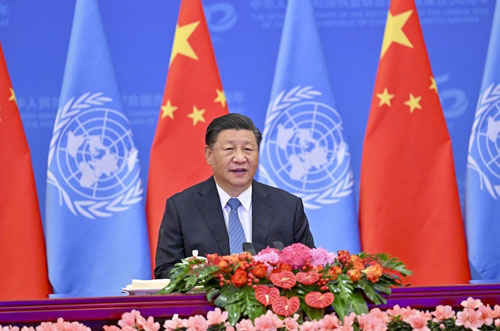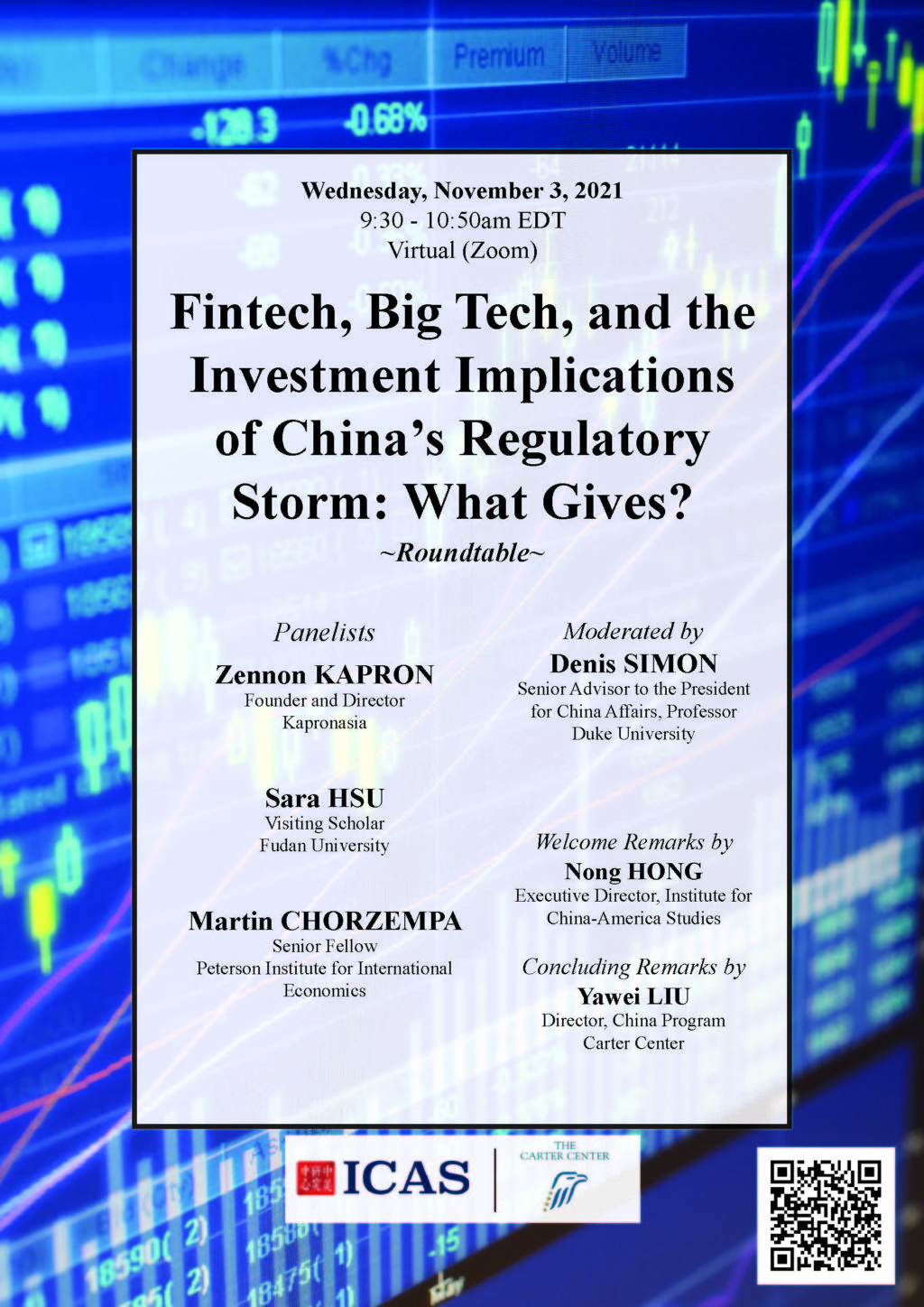
ICAS Bulletin (online ISSN 2836-3418, print ISSN 2836-340X) is published every other week throughout the year at 1919 M St NW, Suite 310, Washington, DC 20036.
The online version of ICAS Bulletin can be found at chinaus-icas.org/bulletins/.

– On November 1, President Xi Jinping delivered a written statement to the COP26 climate conference where he urged all parties to “jointly tackle the climate challenge” but made no mention of a pledge from China. The lack of a Chinese commitment disappointed Western leaders such as France’s Emmanuel Macron, who had asked Xi for a “decisive signal” on climate on a call the week previous.
– On October 31, the U.S. and EU ended a dispute over steel and aluminum tariffs on the sidelines of the G20, agreeing to remove mutual trade barriers, instituted during the Trump administration, and to cooperate on drafting global standards against ‘dirty’ steel in China and elsewhere.
– On October 26, President Biden announced $100m in aid to ASEAN member states to expand the U.S. “strategic partnership” with the bloc. However, ASEAN announced on October 28 that the bloc agreed to upgrade its ties with Australia and China to a “comprehensive strategic partnership” as well, maintaining its neutrality.
– On October 22, the G7 member states agreed to a new set of “Digital Trade Principles” which struck a middle ground between the highly-regulated data protection rules in Europe and the more liberal U.S. approach.

– On October 31, Secretary of State Blinken met with China’s Wang Yi on the sidelines of the G20. Blinken chastized Wang over Chinese threats to the cross-straits status quo while Wang pointed to U.S. “connivance” and “support” for Taiwan as the cause of this instability.
– On October 21, U.S. officials reported that they “are still planning details of the virtual [Biden-Xi] meeting” as Biden has yet to consult with allies at the G7 summit.
– On October 21, Defense Secretary Austin attended a meeting of NATO defense ministers to formulate a new strategic concept post-Afghanistan. While China is on the agenda, Austin refused to comment on a potential attack on Taiwan when probed in a press conference.
– On October 20, Nicholas Burns, Biden’s nominee for Ambassador to China, testified during his confirmation hearing before the Senate Foreign Relations Committee about the advantage that allies gave the U.S. against China and the continued efficacy of the “One-China policy” and strategic ambiguity regarding Taiwan. Rahm Emmanuel, Biden’s nominee for Ambassador to Japan, followed Burns in arguing for the need to deepen U.S.-Japan ties to thwart “Chin[ese] aims to conquer through division.”

– On October 28, FBI Director Chris Wray urged members of the Economic Club of New York to work more closely with law enforcement to stop Chinese hacking.
– On October 27, in the wake of the 16th East Asia Summit, the U.S. and Japan struck a similar note in opposing China’s activities in the East and South China Seas. These comments came alongside joint U.S.-Japanese naval exercises in the South China Sea.
– On October 27, Gen. Mark Milley called China’s recent test of a hypersonic missile “very close to” a ‘Sputnik moment’ that caught “all of our attention,” alluding to the USSR’s early edge in the space race. These comments followed a report by the US Navy on October 21 that announced the completion of a test flight campaign with “high operational tempo for hypersonics.”
– On October 27, the FCC revoked China Telecom’s license to do business in the U.S., arguing that the company is “subject to exploitation, influence, and control by the Chinese government.” This action followed an October 25 letter from House Republicans to Secretary Raimondo urging the Department of Commerce to limit foreign operations and strengthen export controls in key industries to prevent critical data and technology from falling into Beijing’s hands.
– On October 22, the National Counterintelligence and Security Center issued a warning to American tech firms on the dangers of losing a competitive edge to China in the critical fields of artificial intelligence, quantum computing, bioscience, semiconductors, and autonomous systems.

– On October 29, Sandra Oudkirk, the new director of the American Institute in Taiwan, stated in her first press conference that the U.S. is “committed to deepening [its] ties with Taiwan.” These comments came after Tsai Ing-wen confirmed the U.S. troop presence in Taiwan in an interview with CNN and argued the presence is necessary to bolster “people that believe in [democratic] values.”
– On October 27, it was reported that a delegation from the European Parliament will visit Taiwan the following week to push for closer political and economic ties.
– On October 27, President Biden called China’s recent actions in the Taiwan Straits “coercive” in his remarks to fellow leaders at the 16th East Asia Summit.
– On October 25, President Xi delivered a speech at an event commemorating the 50th anniversary of the PRC’s recognition in the United Nations where he defended multilateralism saying “international rules should be drawn up jointly by all 193 UN members, instead of being decided by certain countries…[and be] followed by all 193 UN members.” His comments defending the status quo were widely seen as repudiating an October 22 meeting between American and Taiwanese officials exploring the potential expansion of Taiwan’s participation at the UN.
– On October 22, President Biden told a CNN town hall that the U.S. has “a commitment” to defending Taiwan against a military threat. However, the White House walked back Biden’s comments the day after saying “the president…has [not] made a decision to change our policy [which remains] guided by the Taiwan Relations Act.”

– Data released on October 28 demonstrated that, between November 9 2020 and April 20th 2021, the Department of Commerce issued over $100b in export licenses for semiconductors to blacklisted Chinese companies such as Huawei, meaning that these Chinese suppliers have had continued access to U.S. technology despite their alleged threat to national security.
– On October 25, it was reported that the U.S. Innovation and Competition Act, which contains a key bipartisan measure to appropriate $52b towards the domestic manufacture of semiconductors, has idled in the House since its approval by the Senate in June, prompting concerns over this time-sensitive provision.
– On October 25, Taiwan Semiconductor Manufacturing Co. agreed to provide the U.S. with information related to companies in the global microchip supply chain, raising concerns in Beijing that the U.S. could use this information to sanction Chinese semiconductor firms.
– On October 20, David Bisbee, chargé d’affaires at the U.S. mission to the WTO in Geneva, criticised China’s trade policy and accused Beijing of undermining the WTO’s market-oriented approach by systematically “skew[ing] the playing field against imported goods and services” and employing economic coercion against smaller nations.
– On October 19, President Xi gave a speech emphasizing the importance of the digital economy to China’s continued growth and development, saying that China must “take autonomy of the digital economy firmly in [its] own hands” while also striking a balance between “regulation and promotion” of the industry.

“Yahoo Pulls Out of China, Ending Tumultuous Two-Decade Relationship,” The Wall Street Journal, November 2 [Paywall]
“China, Russia revive push to lift U.N. sanctions on North Korea,” Reuters, November 1 [Paywall]
“China Evergrande Makes Overdue Interest Payment on Dollar Bonds, State Media Says,” The Wall Street Journal, October 22 [Paywall]
“Amnesty to shut Hong Kong offices given national security law risks,” Reuters, October 21 [Paywall]
“Chinese media removes Boston Celtics games after center Enes Kanter’s ‘Free Tibet’ statements,” ESPN News Services, October 21
“NBA’s Enes Kanter Calls for a Free Tibet, Sparks Chinese Backlash,” The Wall Street Journal, October 21 [Paywall]
“China lights Olympic flame ahead of 2022 Beijing Games,” Al Jazeera, October 20
October 21 hosted by Center for Strategic and International Studies
October 28 hosted by Center for Strategic and International Studies
October 28 hosted by Wilson Center
November 1 hosted by Fairbank Center
November 2 hosted by Center for Strategic and International Studies
November 3 hosted by Duke Law
November 4 hosted by Wilson Center
November 10 hosted by Asia Global Institute
November 10-11 hosted by SupChina
November 21-23 co-hosted by Polar Cooperation Research Centre, Polar Law Institute, University of Lapland, and University of the Arctic
Wednesday, November 3, 2021
9:30am – 10:50am EDT

As U.S-China relations have broken down, the Chinese state has rushed through stringent new laws and guidelines to strengthen data protection, deter monopolistic behavior as well as the security of network products and services linked to the cross-border flow of data. The zeal to limit foreign listing of key information infrastructure and core data from being maliciously exploited by an adversary is matched by an equal determination within the Beltway to shield the sensitive personal data of Americans from Chinese bidders of questionable transparency, as well as de-list Chinese companies from major U.S. stock exchanges for a host of reasons ranging from national security risk to their failure to abide by standard audit disclosure requirements. As data and capital markets across the Pacific decouple, a number of high-profile Chinese companies, as well as American investors, have been caught in the crossfire.
In the context of these fast-moving developments, the event will discuss (a) the heady innovation in the fintech space in China and Asia, (b) the motivating factors behind the regulatory storm unleashed by the Chinese Communist Party on its home-grown Big Tech pioneers, (c) the investment implications of these stark Chinese technology regulations for American investors, and (d) the depth of sentiment against China on Capitol Hill as U.S. agencies set about bringing Chinese companies to heel on complying with U.S. legislative and regulatory requirements.
by Nong Hong
October 19, 2021
There is a long-standing debate on the weight or preference given to different sources of international law in jurisprudence. This article aims to discuss the interplay of three pairs of sources of international law; namely between old treaties and new treaties, treaties and customs, and existing treaties and emerging treaties in the context of three regions which are featured with typical maritime related issues. In the Arctic region, the 1925 Svalbard Treaty and the 1982 United Nations Convention on the Law of the Sea (unclos) become the sources of conflicts or different legal positions between Norway and some other States who are parties to both treaties. In the South China Sea, the major legal issue, among many other important ones such as island regime, is the relationship between unclos as a treaty law and historic rights as a customary international law. The Antarctic Treaty System (ATS) may be influenced by the new instrumental arrangements made by Biodiversity Beyond National Jurisdiction (BBNJ) negotiation, reflecting the importance of ensuring the emerging treaty will not interrupt the jurisdiction of established treaties…
This article was originally published by Brill–Nijhoff in the Asia-Pacific Journal of Ocean Law and Policy on October 19, 2021.
by Sarah Hsu
November 1, 2021
China’s technology-enabled digital sector has been a hotbed of activity over the past decade-and-a-half. Backed by a billion or so consumers, dynamic players such as Alibaba (ecommerce), Tencent (social media), Huawei (telecommunications), Baidu (search), and Hikvision (AI), among others, have blazed a trail of innovation and dynamism. In the financial services sector, two large Big Tech firms—Alibaba and Tencent—today account for the vast majority of the domestic mobile payments market as well as host of other services, such as digital credit. The rapid growth, size, and disruptive presence of China’s digital sector has also invited the attention of the Party as well as regulators of late, with the two aiming to balance competing public policy objectives such as innovation and efficiency with social control, market stability, data privacy and consumer protection…
by Sourabh Gupta
October 26, 2021
On October 4, in an eagerly anticipated speech, United States Trade Representative (USTR) Katherine Tai unveiled the outlines of the Biden administration’s “new approach” on U.S.-China trade and tariff policy. The speech was preceded by a months-long, USTR-led interagency review of China trade policy – the first such China policy review in a decade-and-half. Truth be told however, the “new approach” is not terribly different from that of the previous administration’s agenda. Despite castigating the Trump team’s failure to “meaningfully address the fundamental concerns that [Washington has] with China’s trade practices and their harmful impacts on the U.S. economy,” USTR Tai’s approach by-and-large sticks to the failed “paradigm” of her predecessor’s approach…
This commentary was originally published on the China-US Focus website on October 26, 2021.
On Monday, November 1, 2021, Senior Fellow Sourabh Gupta was quoted in the South China Morning Post regarding the conditions for success of Wang Yi’s meetings with EU leaders on the sidelines of the G20 summit.
On Sunday, October 31, 2021, Senior Fellow Sourabh Gupta was quoted in The Star on the implications of the AUKUS security pact on ASEAN’s centrality in the Indo-Pacific region.
On Tuesday, October 26, 2021, Senior Fellow Sourabh Gupta was quoted in the South China Morning Post discussing potential reasons for Xi Jinping’s absence from the G20 and COP26 meetings.

The Institute for China-America Studies is an independent nonprofit, nonpartisan research organization dedicated to strengthening the understanding of U.S.-China relations through expert analysis and practical policy solutions.
1919 M St. NW Suite 310,
Washington, DC 20036
icas@chinaus-icas.org
(202) 968-0595
© 2025 INSTITUTE FOR CHINA-AMERICA STUDIES. ALL RIGHTS RESERVED.